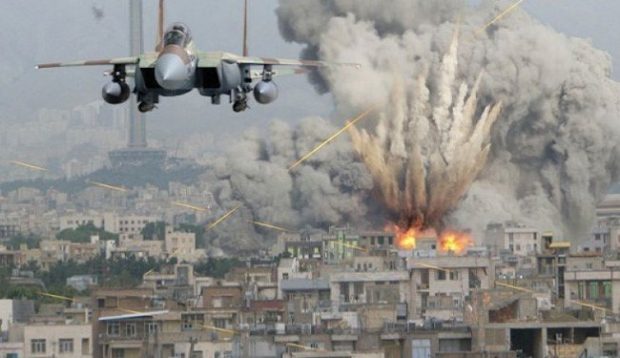US-led airstrikes on Syria killing hundreds of civilians, UN says

At least 300 civilians have been killed since March by U.S.-led coalition airstrikes in the Syrian city of Raqqa, the U.N. says, as ground forces close in on the Islamic State group’s stronghold.
The strikes have been launched in support of the Syrian Democratic Forces, a multi-ethnic alliance fighting to take back the city, which has been ISIS’ de facto capital and center of operations in Syria since 2014. The SDF were closing in on Raqqa for months before launching their offensive on June 6; according to the latest coalition data, 97 percent of coalition strikes are carried out by U.S. aircraft.
“We note in particular that the intensification of air strikes, which have paved the ground for an SDF advance in Raqqa, has resulted not only in staggering loss of civilian life, but has also led to 160,000 civilians fleeing their homes and becoming internally displaced,” Paulo Pinheiro, chairman of the U.N. Commission of Inquiry, told the Human Rights Council Wednesday.
Up to 4,000 ISIS militants are believed to be in Raqqa — some of them senior leaders — along with 50,000 to 100,000 civilians, the U.N. estimates. If the international coalition’s offensive is successful, Pinheiro said, it could liberate Raqqa’s civilian population, “including Yazidi women and girls, whom the group has kept sexually enslaved for almost three years as part of an ongoing and unaddressed genocide.”
Civilians in Raqqa are reportedly receiving contradictory information from coalition leaflets dropped on the city, according to U.K.-based Airwars, an independent monitoring group that has been tracking civilian casualties in Iraq and Syria since 2014. One leaflet told civilians to seek refuge with SDF forces in Raqqa; another, dropped days later, advised them to leave the city.
“This is your last chance,” the second leaflet read, according to an Airwars researcher. “Failing to leave might lead to death. Raqqa will fall. Don’t be there at that time.”
“If they stay in their homes, they’re at risk of being bombed,” said Airwars founder Chris Woods. “If they flee, they risk being shot by ISIS or killed by mines.”
Human Rights Watch warned Wednesday of the coalition’s use of white phosphorus, which is often used to create smokescreens. But the substance ignites upon contact with oxygen and burns extremely hot, meaning it can start fires and burn through flesh.
“No matter how white phosphorus is used, it poses a high risk of horrific and long-lasting harm in crowded cities like Raqqa and Mosul and any other areas with concentrations of civilians,” Steve Goose, the director of Human Rights Watch’s Arms Division, said in a statement.
Raqqa isn’t the only ISIS-held city targeted by coalition strikes in recent weeks. In Mosul, the ISIS home base in Iraq, about 130 civilians have been killed in airstrikes in June alone, according to Airwars — though not all of the airstrikes are confirmed as coalition-led.
“The Americans and their proxies are not taking enough care to protect civilians,” Woods said. “We’ve been seeing escalating civilian casualties even before the offensive on Raqqa began.”
Since President Donald Trump took office, the U.S.-led coalition has killed more civilians in Syria and Iraq than the Russians have killed in Syria, according to Airwars. Prior to January, Russia had consistently been responsible for more civilian deaths than the coalition.
(Source: Vice News)
How to submit an Op-Ed: Libyan Express accepts opinion articles on a wide range of topics. Submissions may be sent to oped@libyanexpress.com. Please include ‘Op-Ed’ in the subject line.
- Russian gas through Ukraine halts - January 02, 2025
- Janzour celebrates community reconciliation - December 30, 2024
- Egypt’s billionaires: We’re all losing money - December 29, 2024


